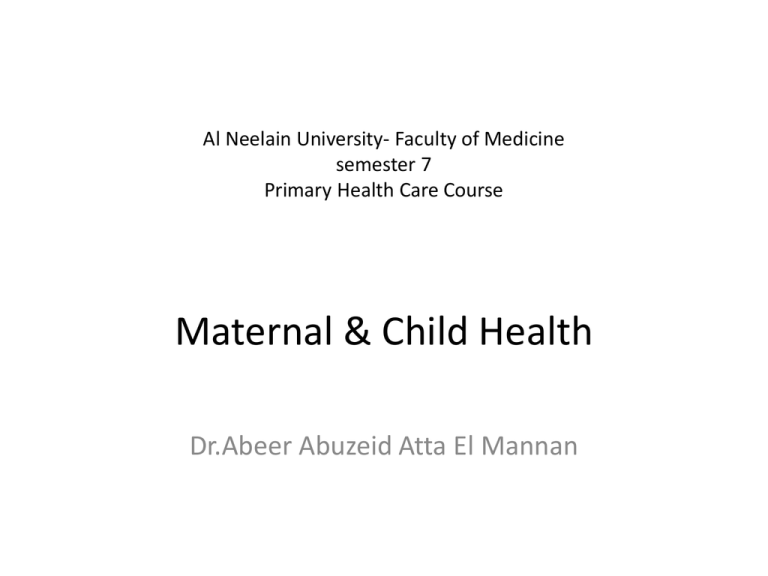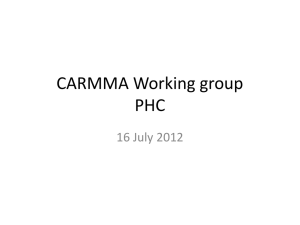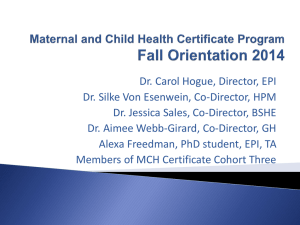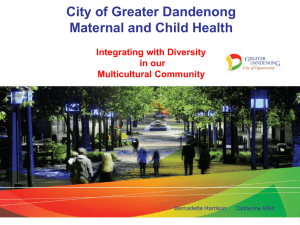5-MCH ~19
advertisement

Al Neelain University- Faculty of Medicine semester 7 Primary Health Care Course Maternal & Child Health Dr.Abeer Abuzeid Atta El Mannan Session outlines • • • • • • What is MCH care? Why maternal and child health are linked? Common MCH problems in Sudan. Recent trends in MCH care services. The service components of MCH care. The main MCH indicators. MCH care • Care provided to special group in population which is especially vulnerable to disease, disability or death (i.e children and women in reproductive age group (15-44)) Why mothers and children are linked? • Constitute large group of population • Constitute a vulnerable (high-risk ) group • Sickness and deaths among mothers and children is largely preventable • Improving health of mothers and children we contribute the health of general population Why Consider Mother and Child as one unit? • The fetus is part of the mother during the antenatal period • Child health is closely related to maternal health • Certain maternal diseases during pregnancy have their effects upon the fetus • After birth ,the child is dependent on mother • In the care cycles mother and child services are inseparable in most occasions • The mother is the first teacher of child MCH services • Encompass curative, preventive,and promotive . Subareas include: • Maternal health • Family planning • Child health • School health • Handicapped children • Care of children in special settings e.g day care centers . Recent trends in mch care • Using integrated approch instead of vertical programmes • Using risk approach for beter use of scarce resources. • Improving manpower skills including wide range of health workers .e.g professionals + field workers. • Primary health care is essential for making services availavle to all MCH problems • • • • • • • • Low birth weight Congenital malformations Behavioural problems Reducation of maternal and child mortality &morbidity Spacing of pregnancies Prevention of communicable diseases Improvement of nutrition Promoting the acceptance of health practices. Common MCH problems in Sudan A high disease burden and inadequate health services leave children exposed to the risks of : • Acute watery diarrhea, malaria, measles . • Severe underweight, with 35 per cent suffering from stunting. • Nearly 40 per cent of the population does not have access to clean water, with nearly 65 per cent not having access to adequate sanitation. • The net primary school attendance rates averaged 71.8 per cent, although only 62.7 per cent actually completed primary school. • More than a third (37.6 per cent) of girls marry before the age of 18. • Female genital mutilation and cutting affects 87.6 per cent of women . Common MCH problems in Sudan (Cont) • While 69 per cent of mothers receive ante-natal care, less than half of those receiving such care benefited from basic procedures such as checking blood pressure. • Only 49 per cent of births take place with the help of a trained health worker. • Only 19 per cent of births take place in a health facility. • More than 10 per cent of all pregnancies result in stillbirths. • Complications in pregnancy and childbirth, combined with a lack of adequate obstetric care services, leaves Sudan with one of the world's highest mortality ratios at 1,107 deaths per 100,000 live births. Common MCH problems in Sudan(cont) • Only one-third of infants are exclusively breastfed in Sudan for the first six months of their life • One-tenth of children under the age of five are severly underweight, • More than 15 per centof children are severely stunted, while just over 3 per cent are severely wasted. • Consumption of iodised salt - vital in prevention against goitre and a valuable contributor to a child's mental and physical development - is just 11 per cent. • More than 20 per cent of children under the age of five have never received vitamin A supplements, critical to strengthening immunity to disease. Common MCH problems in Sudan (cont) • Less than one-third of children receive all the recommended vaccinations before their first birthday. • The proportion of fully immunized children ranges amongst states from a high of 72 per cent to a low of just 5.5 per cent. Common MCH problems in Sudan (Cont) • While more than a third of households have access to a mosquito net, only 18 per cent use an insecticide-treated net - the most effective protection against malaria. • Less than 30 per cent of children under the age of five sleep under such a net. Very few young children - 2.6 per cent - receive anti-malarial treatment within 24 hours of showing symptoms of the disease. • Infants also face societal threats in parts of Sudan. An average of 110 new born babies were being abandoned in Khartoum every month, with half estimated to die before receiving any assistance. • Economic pressure on families, and the stigma associated with children born out of wedlock are major factors leading to abandonment. The stages in maternity cycle • • • • • Fertilization Antenatal or prenatal period Intranatal period Post-natal period Interconceptional period Childhood age-periods • • • Infancy (up to one year of age ) Neonatal period (first 28 days of life) Post neonatal period (28the day to 1 year) Preschool age (1-4 years ) School age ( 5-14 years) Indicators of MCH • • • • • • • • Maternal mortality ratio Mortality in infancy and childhood Perinatal mortality rate Neonatal mortality rate Post-neonatal mortality rate infant mortality rate 1-4 mortality rate Under5 mortality rate Child survival rate. National MCH indicators (Unicef Sudan- Latest estimates ) • Under-five mortality rate of 83 deaths per 1,000 live births. • The infant mortality rate is 60 deaths per 1,000 live births. • Maternal mortality ratio of 215 deaths per 100,000 live births. • Nearly half of children have not been fully immunized. • Nearly 60% of children have their births registered. Assignment • For each MCH indicator ; 1. Provide a definition 2. State the formula for caculating it 3. Mention main causes of mortality measured by that specific indictor 4. State how to prevent mortality measured by that indicator. Thank you





